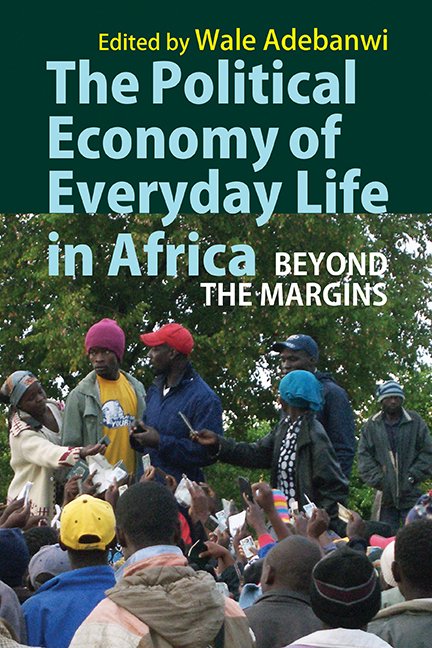Book contents
- Frontmatter
- Dedication
- Contents
- Maps, Illustrations & Tables
- Notes on Contributors
- Foreword
- Acknowledgements
- Approaching the Political Economy of Everyday Life An Introduction
- Part I MONEY MATTERS: CURRENCY & FISCAL LIFE STRUGGLES
- Part II LABOUR, SOCIAL LIVES & PRECARITY
- Part III MARGINALITY, DISAFFECTION & BIO-ECONOMIC DISTRESS
- 7 Precarious Life Violence & Poverty under Boko Haram & MEND
- 8 The Debt Imperium Relations of Owing after Apartheid
- 9 Marginal Men & Urban Social Conflicts Okada Riders in Lagos
- 10 opona, Social Relations & the Political Economy of Colonial Smallpox Control in Ekiti, Nigeria
- Part IV HISTORICITY, TEMPORALITY, AGENCY & DEMOCRATIC LIFE
- Afterword: The Landscapes Beyond the Margins Agency, Optimization & the Power of the Empirical
- Index
10 - opona, Social Relations & the Political Economy of Colonial Smallpox Control in Ekiti, Nigeria
from Part III - MARGINALITY, DISAFFECTION & BIO-ECONOMIC DISTRESS
Published online by Cambridge University Press: 31 August 2018
- Frontmatter
- Dedication
- Contents
- Maps, Illustrations & Tables
- Notes on Contributors
- Foreword
- Acknowledgements
- Approaching the Political Economy of Everyday Life An Introduction
- Part I MONEY MATTERS: CURRENCY & FISCAL LIFE STRUGGLES
- Part II LABOUR, SOCIAL LIVES & PRECARITY
- Part III MARGINALITY, DISAFFECTION & BIO-ECONOMIC DISTRESS
- 7 Precarious Life Violence & Poverty under Boko Haram & MEND
- 8 The Debt Imperium Relations of Owing after Apartheid
- 9 Marginal Men & Urban Social Conflicts Okada Riders in Lagos
- 10 opona, Social Relations & the Political Economy of Colonial Smallpox Control in Ekiti, Nigeria
- Part IV HISTORICITY, TEMPORALITY, AGENCY & DEMOCRATIC LIFE
- Afterword: The Landscapes Beyond the Margins Agency, Optimization & the Power of the Empirical
- Index
Summary
Aina (my sister) and I were the next victims of smallpox in our household. She was the first to go down with a fever. Then, one night, I refused my favourite pounded yam from Yeye, my grandmother. She broke down in tears, blaming Baba (smallpox) for afflicting me. I had no appetite but was in the throes of a very high fever. I was laid on the floor, like my sister, and in spite of the blazing firewood fire provided for us, I was shivering and shaking. Within a few days, I lost consciousness. I have no recollection of the events in my life during that period. When I came round, my little sister, who was less than a year (she was born in October 1944) was nowhere to be seen. She had succumbed to the infection. Naturally, I was moved to tears. My grandmother consoled me lovingly and admonished me to be brave, because it was taboo to cry and mourn over a victim of smallpox.
(Adelola Adeloye, My Salad Years 2009: 94)Introduction
As the terrifying experience of Professor Adelola Adeloye in Ikole-Ekiti in 1945 indicates, Sopona or Baba – as the deity associated with the disease, smallpox, was known – was lethal for some of its victims while others survived. Yet, Adeloye had been vaccinated in school. The unpredictable consequences of contracting smallpox reinforced local beliefs about the deity, Sopona, whose arbitrary power was often immune to the blandishments of Western medicine. Not surprisingly, Sopona was widely feared throughout Ekiti, which affected people's actions when it appeared. People were forbidden to ‘cry and mourn over a victim of smallpox’ for fear of provoking the deity's anger over the possibility that humans might question its actions in the selection of those whom it had affected. It was believed that if Sopona were to see someone crying for a family member, that the remaining members of the household would be stricken as well. This conceptualization of Sopona – as a dangerous orisa (deity) that possessed a person but which could be placated and treated by devotee priests and priestesses (awuro Sopona), contrasted with British colonial officials’ conceptualization of smallpox – as a virus with particular symptoms and aetiology that could be prevented through inoculation.
- Type
- Chapter
- Information
- The Political Economy of Everyday Life in AfricaBeyond the Margins, pp. 266 - 284Publisher: Boydell & BrewerPrint publication year: 2017

